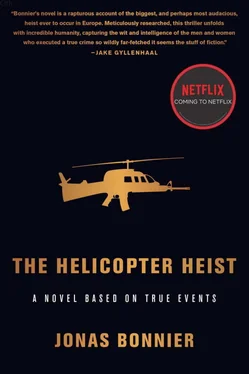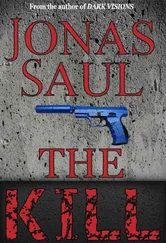Ordering these men and women to storm the cash depot would be extremely risky.
And with civilians inside the building over the road, it would be a risk in which lives would be at stake.
—
Thurn is staring at the computer screen, struck by how calmly the robbers seem to be working. She watches them methodically fill their mailbags with cash. When one sack is full, they swing it up onto their shoulders or drag it across the floor and out of the room. Since they’re coming and going, all dressed alike, it’s difficult to tell how many of them there are. Four, she would guess, but it could just as easily be three or five.
“Where are they?” she asks. “In the vault?”
“No, no,” says Lindahl. “No one gets into the vault. That’s where the big money is. No, they’re up on the sixth floor. We call it Cash. Counting. It’s where we send the notes to be counted. Then they’re sent back down to the vault. We never have more than a few hundred million up there.”
“A few hundred million?” Thurn repeats, amazed.
“Right now, we have over a billion in the building,” Lindahl points out, to put those hundreds of millions in context.
“And there’s no one else there?” Thurn asks, nodding toward the screen.
“The room should be manned…” Lindahl eventually replies. “We have a dozen or so people working in Cash at this time of day. And their orders are to stay put if something happens. But I can’t see them. I don’t actually know…”
“So even with your eighty CCTV cameras, you can’t tell whether your staff are in harm’s way?”
Palle Lindahl shakes his head. “No,” he says. “I can’t.”
“No,” Thurn says.
“But what I can say, and unequivocally,” the security chief continues, without any attempt to hide his sense of wronged irritation, “is that if you storm that building and arrest the robbers, our staff—wherever they are—will be much better off.”
The headphone in Thurn’s ear starts to ring, and she presses the button on the cable around her neck. The pilots have finally taken off, she thinks.
But it isn’t the young helicopter pilot’s voice she hears in her ear, it’s Mats Berggren’s.
“I just spoke to Hertz,” he says. “There won’t be any helicopters from Uppsala or Berga.”
“There aren’t any?”
“Hertz is at Police HQ. I don’t know what’s happening, but the message from the military authorities is that we’ll have to handle this ourselves.”
“Politics.”
“They’ve promised to watch the radar. They can see everything in the air, they say. Apparently they’ve already seen our robbers’ helicopter a few times. Both when it took off and when it got to Västberga.”
“Politicians,” Thurn repeats.
“Hasn’t our helicopter taken off?” Berggren asks.
“No,” Thurn says, glancing at her watch. “But the pilots should have made it to Myttinge by now.”
“The Task Force is getting ready,” Berggren tells her.
“Getting ready?” Thurn is dismissive. “By the time they get here, there won’t be anyone left.”
But then the inspector spots something that puts her in a better mood. Two riot vans are approaching the gas station. The robbers’ white helicopter has also just dropped down toward the roof. It’s hovering just above the cash depot now. There’s no doubt about it: the pilot has also seen the riot vans.
Thurn nods to herself.
These are the type of officers she’s willing to send into the building.
“Finally,” she says in the direction of the frustrated security chief.
5:40 a.m.
The riot vans drive up to the gas station and come to a halt next to Thurn. An enormous police officer climbs out of one of them, he has to be over six and a half feet tall, with a crew cut and shoulders like a bodybuilder. He’s the commanding officer.
“Who’s in charge here?” he barks.
Thurn points to herself. The man nods uninterestedly and glances over to the building and the helicopter hovering above it.
“You want us to take him down?” he asks.
“Take him down?”
“We can shoot the bastard down,” the uniformed officer says with a confident nod.
Thurn looks up at the helicopter. The beefed-up policeman is insane, she thinks. Shooting down the helicopter while it’s hovering above the roof could cause it to explode and fall onto a building full of people. What is he thinking? But before Thurn has time to say anything, Palle Lindahl sticks his head out of the police van.
“The robbers seem to be on the move,” he shouts.
He has his laptop in one hand, prepared to prove his words by showing them the images from the CCTV cameras.
Thurn turns to the riot squad leader.
“Storm the building,” she says to him. “Now. Get them before it’s too late.”
It’s time for Palle Lindahl to prove that being able to open doors from his computer wasn’t just talk.
The riot squad leader is already striding back toward his van. Thurn glances at her watch. Why hasn’t the helicopter pilot called?
5:41 a.m.
Jack Kluger is breathing too quickly. He’s hyperventilating. And because his body isn’t getting enough oxygen, his hands are shaking. He’s been through this before. Many times. He knows he needs to calm down. He needs to breathe more deeply, draw air into his lungs.
But it’s impossible.
Nothing is happening. The green light from his watch is glowing fiercely on his wrist. Almost thirty minutes have now passed. Thirty minutes. Something must have happened. How long should he wait, how long should he just sit in position above the roof, waiting for them? Would it be better to just leave?
He has no way of communicating with the robbers inside.
What are they waiting for?
—
And right then, the fuel-warning light starts to blink. In the darkness inside the helicopter, the red light pulses with unrelenting arrogance. The countdown is serious now. The light’s blinking matches the pounding of the blood in Kluger’s temples. Beneath him, on the dark ground, the flashing blue lights of the police cars cast long, licking beams of light onto the cash depot, which lies heavy and calm. The building’s powerful brick walls and dimly lit windows give no indication of anything in particular going on inside.
In the bright glow of the light on the roof, Jack Kluger is at no risk of making a mistake. He gently tilts the helicopter forward a fraction and stares down at the ladder that is still sticking up through the broken window.
No movement, no shadows, nothing.
The roof is empty.
The red fuel-warning light illuminates his face. His blue eyes reflect the blue light from the police cars over by the gas station. It’s getting more and more crowded down there, new cars keep arriving all the time.
The helicopter pilot doesn’t notice that he’s sweating. He is no longer thinking about his breathing being too quick or too shallow.
—
Suddenly, something new happens down by the Statoil station. Kluger spots it out of the corner of his eye, and he turns the stick to the right so that the helicopter twists in the air. He sees the two riot vans arrive.
Having done small jobs for Balik in Södertälje for over a year now, Jack Kluger knows that riot vans are a bad sign. They’re full of the kind of police officers he remembers from Texas. People who aren’t afraid of firing a weapon, people who don’t care.
Again and again, Kluger stares toward the southern horizon. He expects to see the police helicopter approaching at any moment, and he makes up his mind: If it appears, it’s over. He’ll fly away.
Читать дальше












